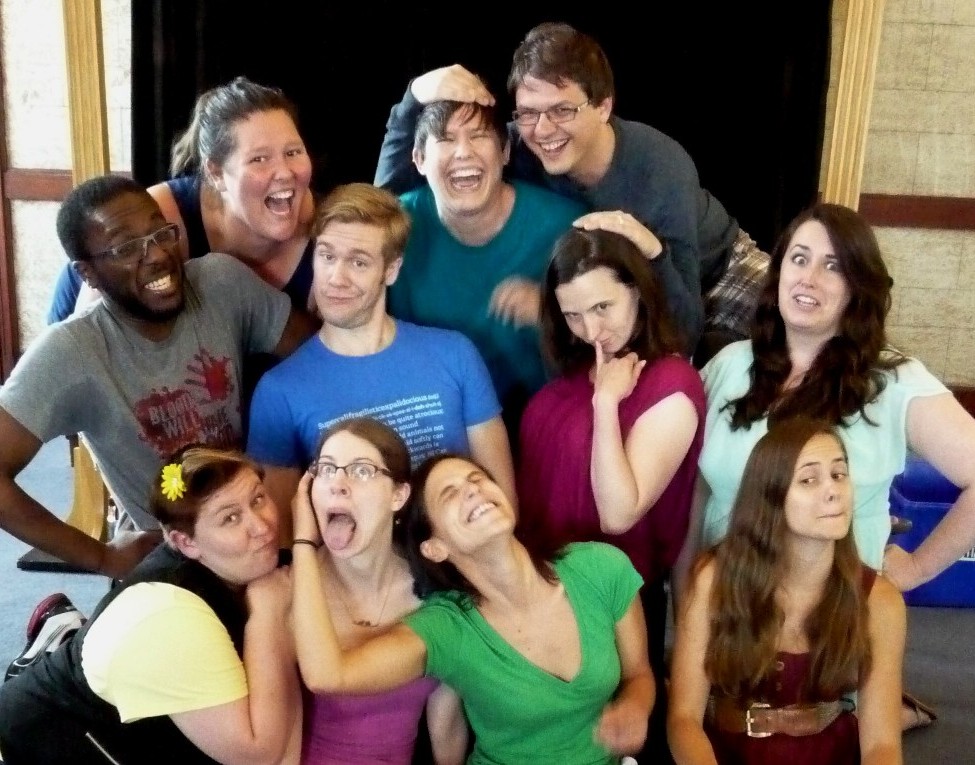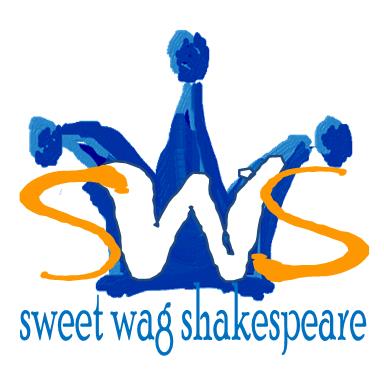In the weeks-long debate about our company name, we encountered a crucial dilemma: do we choose a name that fits with our season selection, or one that fits our personality as an ensemble? This discussion began on the first day of company building during May Term, with nearly every option proposed being promptly rejected. A few suggestions gained traction early on, but many of us still searched for that elusive spark of inspiration that would tie everything together.
At the end of the third week, during table work on Cymbeline, we encountered this line of text spoken by Pisanio: “[A] waggish courage, / Ready in gibes, quick-answer’d, saucy, and / As quarrellous as the weasel,” and something clicked. The naming debate resumed with renewed fervor, and in the last hour of the last day of May Term, we arrived at a name: Sweet Wag Shakespeare. “Wag,” derived from “waghalter” (one likely to be hanged), among other things means animated motion, a joker, or a maker of (good-natured) mischief. “Sweet,” as opposed to any other adjective, is a nod to both our adventures in Eastcheap in our first-year production of 1 Henry IV, and to what we consider the true nature of our collective waggery.
Indeed, that “waggish” energy buoyed us during our Ren 531 experience (inside sources indicate it may have been what influenced our directors, Doreen Bechtol and Matt Davies, to choose that particular play for us in the first place), and revealed itself again in our second year through our dramatically diverse and wonderfully wayward Thesis Festival presentations in February 2015. We are abidingly animated, ceaselessly sassing, and frequently flirting with disaster. In short, we are a bunch of Wags, our tongues firmly planted in our cheeks.

The Season
Hamlet, Shakespeare’s War of the Roses, As You Like It, The City Nightcap, and Cymbeline: disguise, puppets, paper swords, human kickball, and deus ex machina. Think you know which play contains which? Think again. Audiences can expect the unexpected, with new twists on old favorites, in addition to several unfamiliar or original texts. True to our nature, we Wags intend to investigate questions of succession, gender, family, and trust in our diverse season of a devised piece, five early modern plays, and two staged readings by both honoring boundaries and pushing them in the most creative and collaborative ways.
The season opened on September 6 with the Wags’ devised show Strange Absence, created by the Wags under the guidance of Bechtol. Elements of the season’s five plays inspired the show. The goal of the devised show is to build a strong ensemble through daily physical training while creating original compositions to heighten our relationships to the characters, plots, and themes within each play in our season. In addition, this performance integrates elements of our mission and explores our individual and company identies within the culture and community that we inhabit. This waggish work began in early August.
The company’s touring shows kicked off on October 12 with a 60-minute education production of Hamlet directed by Aubrey Whitlock. Inquiring Wags want to know: In a world in which anything we do can be seen by anyone, when are we not performing? How do we know when (or if) we are truly alone? Geared toward high school and college audiences, this production uses the surveillance scripted in Shakespeare’s play to comment on the pervasive culture of private-becomes-public and the roles we all play whether we want to or not. A waggish conflation of all three extant texts, our production of Hamlet will ultimately ask our young-adult audiences to consider the true difference between reality and performance, if such a difference even exists, and, if it doesn’t, what we should do about it.
Sweet Wag Shakespeare will round out our tour offerings with two small-scale shows, Shakespeare’s War of the Roses directed by Marshall B Garrett and As You Like It directed by Merlyn Q. Sell. Both productions will seek to stretch the boundaries and conventions of the small-scale genre with monumental challenges to their production teams. Shakespeare’s War of the Roses — our first original conflation/adaptation of multiple Shakespeare plays (2 and 3 Henry VI) — will feature more than 90 characters played by five female actors. These women will enter the liminal space of the stage and valiantly tackle “men’s issues” of power, of succession, of war. Waggishly analogous to the upcoming presidential race, the themes of power behind the throne, women in power, dynastic succession, and anti-intellectualism will ring true with anyone following American politics today. Conversely, As You Like It stands out in Shakespeare’s canon as the rare play wherein the heroes triumph not from violence and revenge but through kindness and compassion, and the villains are not punished but reformed. As such it will present a powerful yet subtle counterpoint to Sweet Wag’s other touring shows: a different lens through which to see, as Touchstone puts it, “how the world wags.” Gentler, but no less ambitious, As You Like It will have a cast of only three actors and will incorporate found-object puppetry and music to investigate themes of gender and class. These two contrasting, compelling, and complementary studies in waggery will open December 5.
With the new year will come a new genre and a nearly-forgotten play. The Wags will dive into 2016 with Robert Davenport’s The City Nightcap, rehearsed and performed in “Ren” style with no director and a limited rehearsal period. The City Nightcap is by turns an incisive investigation of gender politics and a comedic romp filled with kicks both literal and figurative. Sweet Wag Shakespeare’s production of The City Nightcap in February will explore, ask questions about, and perhaps attempt to resolve some of the play’s ideas about class and status, gender roles and female agency, and the theatricality of trial and punishment.
The Year of the Wag will conclude with Cymbeline. Guest of the program Leslie Reidel, from the University of Delaware Professional Theatre Training Program, will direct the production. Considered by the Wags to be “Shakespeare in a blender,” Cymbeline unites many of the threads running through the rest of the season. The relationship between Imogen, Cymbeline, and the Queen parallels and differs from the relationship of Hamlet to Gertrude and Claudius. The cross-dressing and ensuing gender confusion of As You Like It comes into play when Imogen, disguised as the boy Fidele, encounters her long-lost brothers. The contention between Britain and Rome in Cymbeline can further the company’s exploration of rulership and militarism begun with War of the Roses. And Cymbeline takes an even more drastic approach to male fears of cuckoldry than does Davenport’s The City Nightcap. The action, romance, and spectacle that the play demands promise a dynamic and enjoyable experience for us Wags and for our audiences. Cymbeline will open in March 2016.
In addition to these five plays, Sweet Wag Shakespeare was invited to participate in ASC’s October staged reading of The False One by John Fletcher and Philip Massinger, directed by our fellow Wag, Natalia Razak Wallace. In a groundbreaking move never before attempted by an MFA company, Sweet Wag Shakespeare will also premiere One Woman Town, an original work penned by Merlyn Q. Sell. An opus of Shakespeare-inspired parody sprinkled with the gun-slinging melodrama of the Wild West, the staged reading of One Woman Town will be performed in the fall, with the possibility of a revival performance in the spring.


